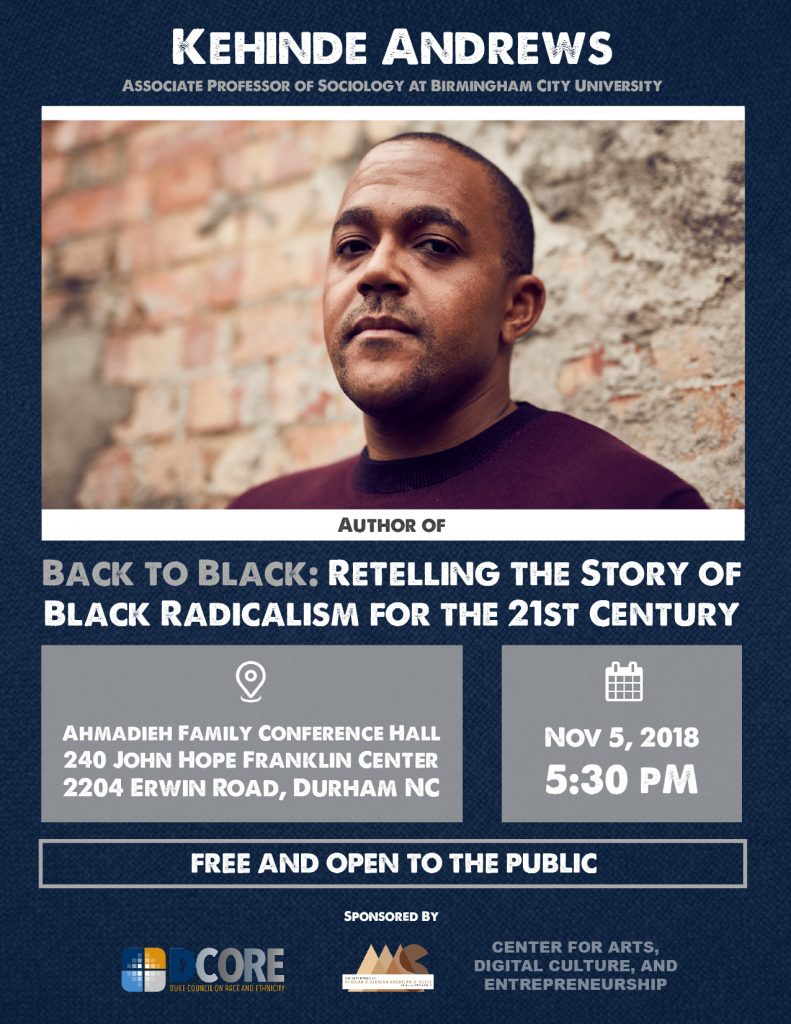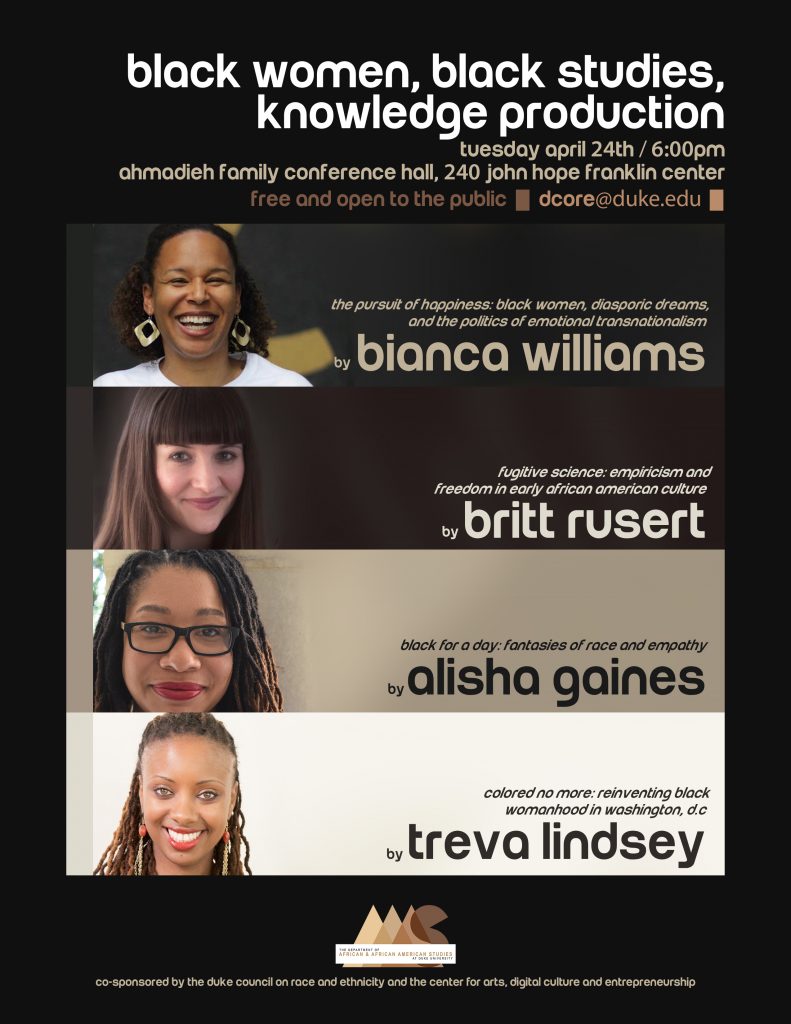Home » African and African American Studies (Page 2)
Category Archives: African and African American Studies
AAAS Town Hall 2018: Reparations Now?
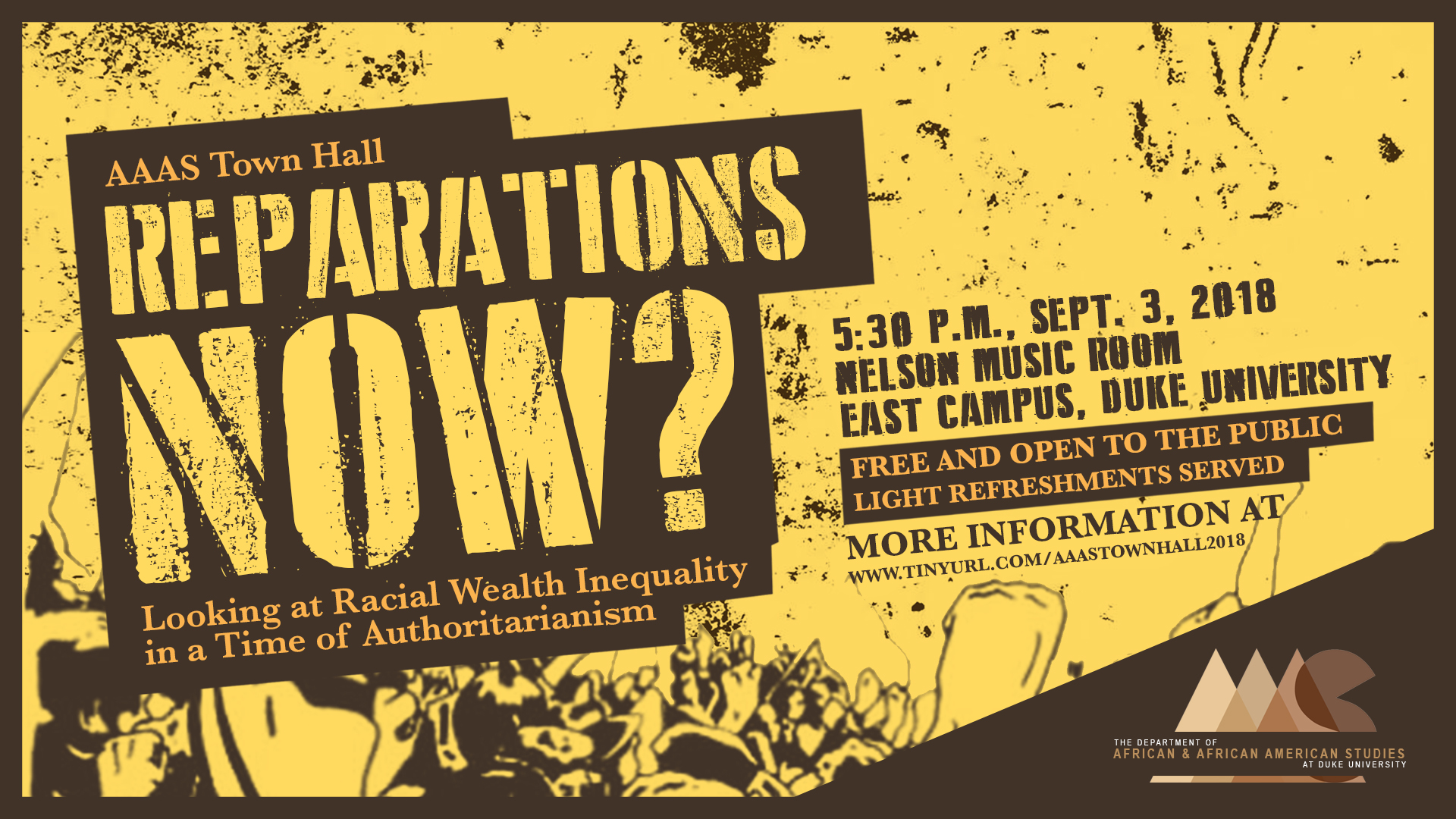 The Department of African and African American Studies (AAAS) at Duke University will kick off the 2018 academic year with a town hall forum on reparations.
The Department of African and African American Studies (AAAS) at Duke University will kick off the 2018 academic year with a town hall forum on reparations.
The event, “Reparations Now? Looking at Racial Wealth Inequality in a Time of Authoritarianism,” will be held at 5:30 p.m. on Monday, Sept. 3rd, in the Nelson Music Room, East Duke 201, on the university’s East Campus. It is free and open to the public. Light refreshments will be served.
Panelists will address the question: What might come of public dialogue around the question of reparations for African Americans in the era of the Trump regime with its continual attacks on the press and dissemination of knowledge, and while there is a Republican-controlled Congress?
“We are living through a moment when two converging elements of our social, political, and economic existence are coming together: the existence of heavily racialized wealth inequality and increasing authoritarianism,” says Wahneema Lubiano, a professor of African and African American Studies.
Lubiano is co-organizing the event with William “Sandy” Darity, the Samuel DuBois Cook Professor of Public Policy, and a professor in the Sanford School of Public Policy, Department of Economics as well as the Department of African and African American Studies.
Darity has been a long-time advocate of reparations for black Americans. In a 2016 article in The Atlantic he wrote, “There is no doubt that the political obstacles to congressional approval of black reparations are significant. … If black reparations is the right thing to do—and I know in the depth of my soul that it is—then we should work to make it happen, no matter how long the odds. We should not bow at the altar of presumed political expediency.”
Lubiano says that raising the issue of black reparations offers an opportunity to consider “the complexities of black reparations against the fear that U.S. democracy itself is being roiled by authoritarianism.”
“We’re going to discuss what reparations has meant and could mean, what concepts are embedded in the public discussion of wealth inequality, and what the relation of reparations might be to changing racialized wealth inequality, all while authoritarianism is both gathering force and contested,” she said.
Panelists are:
- William A. Darity, Jr.
Duke Sanford School of Public Policy, Departments of African & African American Studies, and Economics - Laurent Dubois
Duke Department of History - Malik C. Edwards
NCCU School of Law - Amber S. Hendley
Duke Departments of Economics and Political Science - Andrew Lee
Duke Department of Computer Science - Wahneema Lubiano
Duke Department of African & African American Studies - Joseph R. Winters
Duke Departments of Religious Studies and African & African American Studies
Black Studies All Up In Your Classroom: Students Create Online Curriculum
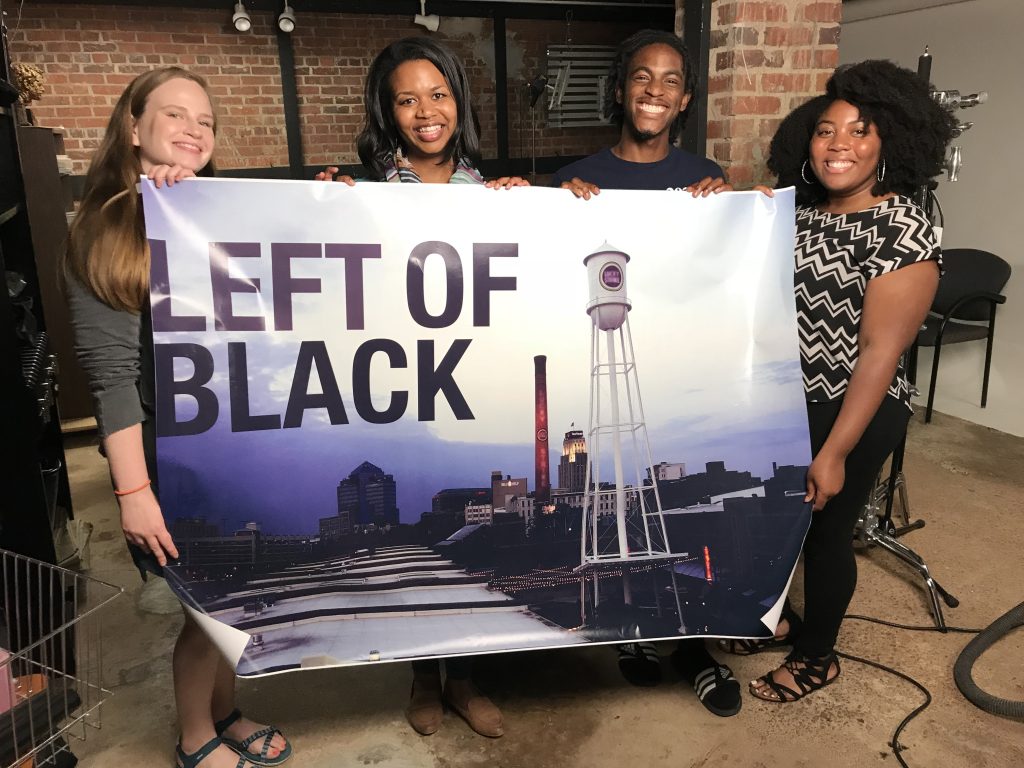
Find the stories. Make lesson plans. Put it online.
That’s what a team of students working for the weekly webcast Left of Black was tasked with this summer, but it wasn’t so simple. The webcast showcasing scholars, artists, musicians, just completed its 8th season. That meant there were nearly 250 videos and guest interviews to sort through, many of which hadn’t been in circulation since they first aired years ago.
With funding from Story+, a 6-week summer research program in the Franklin Humanities Institute (FHI), the students, two graduate and two undergraduate, set out to accomplish the mission. Using their respective skills of creating lesson plans, video editing, website building and some acquired new skills, they found interesting stories in the Left of Black archive and turned them into online teaching modules for middle- and high-school students.
The enrichment modules include a video clip derived from a Left of Black episode, a lesson plan and a “digital student experience,” as well as supplemental reading. The Story+ Left of Black team exceeded their initial goal of creating two modules — the team was able to produce four — and made their final presentation at a FHI research symposium on Wednesday, June 27 at Smith Warehouse.
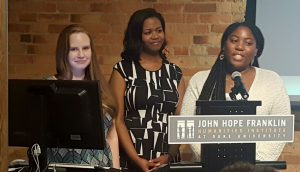
The themes covered in the modules are: service and citizenship, the cultural significance of Black barbershops, the role of music in the Black Power Movement, and Black armed resistance. Each module includes discussion questions, timelines, vocabulary and further reading and is in alignment with the state’s common core standards. The digital experiences and lesson plans can be accessed online here: https://sites.duke.edu/leftofblackenrichment.
Duke undergraduates Ce’Ondra Ellison and Malcolm Brown had both taken classes in Duke’s Department of African & African American Studies and were passionate about what themes and characters they might find.
“This information is so lacking,” said Ellison, an African-American Studies major from High Point, N.C. “I am hoping this work will have long-lasting impact on education.”
Brown was enthusiastic about the project, and quickly grasped the technical aspects of the project like animating a grandmother for a video clip about Black armed resistance.
Graduate students Allison Raven and Nicole Higgins each had prior experience teaching in classrooms and creating lesson plans.
The Story+ experience “allowed me to stay connected to work I had been doing before with high school teachers, which is easy to lose in academia,” Higgins said.
Raven agreed.
“I think we have been extraordinarily lucky with our team. None of us knew each other before beginning the project. For something that relies so heavily on teamwork, this could have gone really badly, but we all balance each other really well and work well together. And I loved the collaborative aspect,” Raven said.
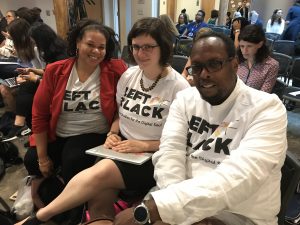
As a team, Raven said they gained a deeper understanding of how to tell stories in the digital age and which tools to use, including social media. The team won FHI’s Story+ Instagram challenge.
FHI’s Chris Chia, Amanda Starling Gould, and Eric Barstow, provided infrastructure and guidance as the Left of Black team delved into the archive and selected a WordPress template on which to build the website.
Left of Black host Mark Anthony Neal, who is also the chair of African & African American Studies at Duke, helped the students select four episodes in which to focus their efforts:
- Quincy T. Mills, a history professor at Vassar College and author of “Cutting Along the Color Line: Black Barbers and Barber Shops in America”;
- Chad L. Williams, chair of the African American Studies Department at Brandeis who wrote, “Torchbearers of Democracy: African American Soldiers in the WWI Era”;
- Ricky Vincent, author of “Party Music: The Inside Story of the Black Panthers’ Band and How Black Power Transformed Soul Music”; and
- Akinyele Umoja, an associate professor of African-American Studies at Georgia State who wrote, “We Will Shoot Back: Armed Resistance in the Mississippi Freedom Movement.”
The students took excerpts of these videos and used graphics and animations to produce enrichment videos like this one:
First started in 2010, Left of Black is now entering its 9th season. Neal has interviewed a number of notable scholars over the years including Carrie Mae Weems, Cornel West, Michael Eric Dyson, Marc Lamont Hill and Melissa Harris Perry. There are plans to continue building the Left of Black curriculum and digital platform.
“It has reinvigorated the project for me,” Neal said. “It’s something we had envisioned from earliest days of Left of Black and we were thrilled to have a team of students to help us realize that vision. It serves as model for what integrated learning could look like, not just at Duke but in the production of scholarship for a broader audience.”

Co-Creating Knowledge: An Intellectual Reunion of Duke Alumnae

More than 50 people gathered in the Ahmadieh Family Conference Room on Tuesday evening, April 24, for a special meeting of Duke’s Introduction to African & African American Studies class, taught this spring by department chair Mark Anthony Neal.
Professors Britt Rusert, Treva Lindsey, Alisha Gaines and Bianca Williams are Duke Ph.D.’s who each had a book on blackness published in the past year. Neal made those books assigned reading for the spring class and invited the alumnae back to campus to speak with students and to revisit their formative years where the seeds for their intellectual pursuits were planted.
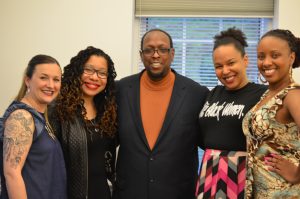
The symposium, “Black Women, Black Studies, Knowledge Production,” was entirely curated by graduate and undergraduate students in a demonstration of vertical learning. English Ph.D. student and teaching assistant Israel Durham designed the program for the 2.5 hour symposium, allowing each student an opportunity to converse with the authors.
The students, divided into small groups, passed a microphone and peppered each alumna with thoughtful questions related to their research as well as their scholarly approach and process. View Photos
Wearing a “#CiteBlackWomen” t-shirt, Williams told students that what they were experiencing was special and a testament to the “brilliant teaching” at Duke.
“You get to co-create. You also know things. You have useful questions. You know enough to engage scholars,” she told students.
“I just want you to know this isn’t normal. This doesn’t usually happen,” Williams said, noting the generosity of professors like Neal and Wahneema Lubiano, an associate professor and mentor to the women, who also attended and joined the women for the last panel of the evening.
“Wahneema would write down every foolish thing we said,” Williams remembered of her time as a student. “It might not have been what I said, but [she knew] what I meant. She would take our nugget, add to it, and give it back… That is generosity and it’s not the norm. After being in other environments, I want you to know this is a gift that we all received.”
Lindsey agreed, reminiscing about the familial kinship she felt in her cohort and with the faculty.
“The faculty believed in us as knowledge producers,” Lindsey said. “I wouldn’t have made it without Wahneema and MAN because of the confidence they instilled in us to be voices, but also to be on the front lines when things went down here,” Lindsey said. “That is the type of faculty member I want to be.”
Gaines, who is interested in black popular culture and reality television, said Black women gave her a way to imagine herself as a scholar and a thinker, especially as an undergraduate student at Spelman.
“I’m a good teacher because I have had good models for it,” Gaines said.
Rusert remembers the freedom to be intellectually adventurous while she was a student at Duke.
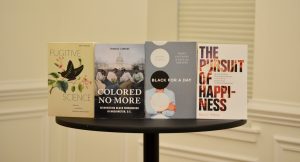 “I was 22 years old and remember being in that class (The Post-Black Aesthetic). MAN took our ideas seriously. I remember being like ‘wow!’ This professor really wants to hear what I think,” she said, adding that the interdisciplinarity of the department prepared her for study in her field in unexpected ways.
“I was 22 years old and remember being in that class (The Post-Black Aesthetic). MAN took our ideas seriously. I remember being like ‘wow!’ This professor really wants to hear what I think,” she said, adding that the interdisciplinarity of the department prepared her for study in her field in unexpected ways.
Also, she said that she’s been able to confront Southern bias as a professor now teaching in New England.
“I am really grateful to have had time training in the South because I can correct some misunderstandings,” Rusert said.
Rusert is an assistant professor in the W. E. B. Du Bois Department of Afro-American Studies at University of Massachusetts, Amherst, is the author of Fugitive Science: Empiricism and Freedom in Early African American Culture and co-editor of W. E. B. Du Bois’s Data Portraits: Visualizing Black America, a collection of data visualizations Du Bois contributed to the 1900 Paris Exposition and forthcoming from Princeton Architectural Press in fall 2018. She earned an English Ph.D. and certificate in feminist studies from Duke in 2009. She is beginning a new monograph about William J. Wilson’s African-American Picture Gallery (1859), a text that imagines the first museum of black art in the United States.
Lindsey is an associate professor and the Director of Undergraduate Studies of Women’s, Gender, and Sexuality Studies at The Ohio State University. She authored, Colored No More: Reinventing Black Womanhood in Washington D.C., a Choice 2017 “Outstanding Academic Title.” Recently dubbed #ProfessorBae by Bossip magazine, Lindsey’s research and teaching interests include African American women’s history, black popular and expressive culture, black feminism(s), hip hop studies, critical race and gender theory, and sexual politics. She earned a master’s degree and a Ph.D. in history at Duke.
A lifelong Michael Jackson fan, Alisha Gaines received a Ph.D. in English from Duke and also received the graduate certificate in African and African American Studies. She is assistant professor of English at Florida State University where she won a university-wide Undergraduate Teaching Award in 2017. Her first book, Black for a Day: Fantasies of Race and Empathy, was published in Spring 2017. Inspired by the short-lived F/X reality tv show “Black.White,” the book constructs a genealogy of white liberals who temporarily “become” black under the alibi of racial empathy. As such, Gaines has a love/hate relationship with Rachel Dolezal.
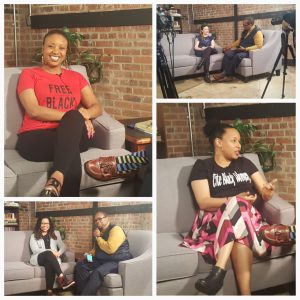
An associate professor of anthropology at The Graduate Center, City University of New York, Bianca Williams is also Black Lives Matter organizer, co-founding the Denver chapter. She earned a bachelor’s degree and a Ph.D. in cultural anthropology at Duke, and a graduate certificate in African and African American Studies. Her book, The Pursuit of Happiness: Black Women, Diasporic Dreams, and the Politics of Emotional Transnationalism, how African-American women use international travel and the Internet as tools for pursuing happiness and leisure; creating diasporic relationships; and critiquing American racism and sexism. Central to her research is the question, how do Black women develop strategies for enduring and resisting the effects of racism and sexism, while attempting to maintain emotional wellness?
Neal, host of weekly webcast Left of Black, interviewed the four women about their work earlier that day in the John Hope Franklin Center studio for upcoming episodes of the show. An appearance on Left of Black has increasingly become a rite of passage for a network of young black studies scholars.
“A cohort experience becomes part of our building of knowledge so the production part is apparent. We’re making it as craft, it’s not an arcane thing,” Lubiano, an associate professor of literature and a long-time Duke faculty member, told students at the symposium. “We are actively participating in creating knowledge, thinking about the students and making them central to the work early on.
“I’ve seen students go from undergrad to full professorships,” she said. “Making knowledge is not a finished ‘house,’ we’re always building. It’s important to make your fracturing speak to someone else’s fracturing. We take seriously the process of remaking knowledge.”
Arturo Schomburg and the Jim Crow South
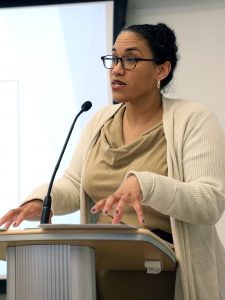
On Wednesday, Vanessa K. Valdés of The City College of New York, presented her research on Arturo Alfonso Schomburg, whose personal collection became the foundation for the Harlem-based and world-renowned Schomburg Center for Research in Black Culture.
Valdés is the author of “Diasporic Blackness: The Life and Times of Arturo Alfonso Schomburg,” only the second full-length biography.
During her talk, “Building an International Archive in the Jim Crow South: Arturo Schomberg at Fisk University,” Valdés highlighted the collector’s global vision for his collection as well as the importance of access to the material.
The lunchtime talk was the latest installment of “Wednesdays at the Center,” held at the John Hope Franklin Center, which features a different speaker each week throughout the semester.
Valdés, a professor of Spanish and Portuguese, said that Schomburg, a Black Puerto Rican, helped establish Fisk University’s Africana collection in Nashville, now named the John Hope and Aurelia Franklin Library.
“Most have no idea about the man himself,” said Valdés, who pursued her graduate degree in Nashville. There is only one biography of Schomburg and it was published in 1989, she said.
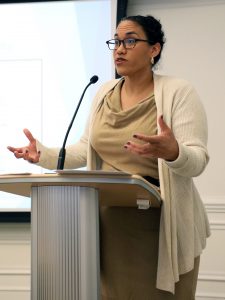 The Carnegie Foundation bought Schomburg’s personal collection for $10k which he used to travel across Europe and further develop his collection. However, he donated much of his work without compensation.
The Carnegie Foundation bought Schomburg’s personal collection for $10k which he used to travel across Europe and further develop his collection. However, he donated much of his work without compensation.
In Nashville, Thomas E. Jones was president of Fisk when Schomburg began assembling the library in 1929. He worked alongside his good friend, sociologist Charles S. Johnson, to replicate what he had accomplished in New York, building a black archive in Fisk University’s Cravath Hall, complete with a reading room.
“At the time, black people were steered toward vocational schools and not necessarily reading for pleasure,” Valdés said. Under Schomburg, Fisk established a reading room to “inculcate a desire” in students to read for pleasure.
“Being an active member of society meant being knowledgeable. He was creating spaces of liberation,” Valdés said. Schomburg spoke through his collection, highlighting moments of black independence and responding to U.S. hegemony in the Caribbean.
The Fisk collection concentrated on presence of people of African descent internationally, taking on a global character, telling the story of blacks in Europe and the Caribbean. There were 140 books when Schomburg arrived and more than 4,000 by the time he left Fisk. His efforts were not replicated at other schools until decades after his death, she said.
Johnson, the first black president of Fisk, acknowledged Schomburg’s “generosity and foresight” in curating books for the university’s then-named Race Relations Institute.
“Johnson was trying to get Schomburg to write his book but he wasn’t interested in that. He only wanted to disseminate his work,” Valdés said. “It’s important to consider different modes of scholarship and knowledge production. Establishing the collection, made it unequivocal that black folks were worthy of study and international analysis.”
The event was sponsored by the Center for Arts, Digital Culture and Entrepreneurship at Duke.
A Conversation on the State of Voting Rights in N.C.
 DURHAM, N.C. – On the eve of a federal briefing on voting rights in Raleigh on Friday, a panel of experts will gather at Duke Thursday night to discuss the state of voting rights in North Carolina.
DURHAM, N.C. – On the eve of a federal briefing on voting rights in Raleigh on Friday, a panel of experts will gather at Duke Thursday night to discuss the state of voting rights in North Carolina.
The U.S. Commission on Civil Rights, an independent federal watchdog agency, will hold a public hearing in Raleigh, which will include testimonies about N.C. voter experiences at the polls. Ahead of the hearing, The Duke Council on Race and Ethnicity (DCORE) and The Raben Group are co-convening a Thursday, Feb. 1, panel discussion and public forum to bring attention and awareness to voting rights issues.
The free event will be held at 5:30 p.m. in the Ahmadieh Family Lecture Hall at Smith Warehouse, Bay 4, C105 (114 S. Buchanan Boulevard, Durham). Free parking is available. Those unable to attend can watch a live stream here: https://www.youtube.com/watch?v=pgQ9mgFZYME.
The forum is intended to allow scholars and community leaders to examine the state of voting rights in North Carolina and to provide cultural and historical context for the hearing.
Panelists include:
- Debo Adegbile, commissioner, U.S. Commission on Civil Rights
- Juliana Cabrales, National Association of Latinx Elected Officials
- Richard L. Engstrom, faculty affiliate, Social Science Research Institute at Duke University
- Kerry Haynie, professor, political science, Duke University
- Catherine Lhamon, chair, U.S. Commission on Civil Rights
- Theodore M. Shaw, Julius L. Chambers Distinguished Professor of Law and Director of the Center for Civil Rights at the UNC School of Law
The event will be moderated by Mark Anthony Neal, chair of the Department of African and African American Studies at Duke, which is co-sponsoring the forum.
The following day, Feb. 2, the U.S. Commission on Civil Rights will hold a day-long public meeting in Raleigh to gather public testimony about voting rights obstacles in for its 2018 report to Congress. The Commission plans to address voting rights enforcement efforts after the 2006 reauthorization of the temporary provisions of the Voting Rights Act of 1965 and the impact of the Shelby County v. Holder Supreme Court decision. The Commission will also consider enforcement of Sections 2 and 203 of the Voting Right Act, and whether new or enhanced federal protections could expand voting opportunities for all Americans, including those historically underrepresented because of their race, color or minority language group membership.
For more information on the hearing, visit http://www.usccr.gov/press/2018/01-26-Sunshine-Notice.pdf.
POSTPONED: How To Get Nominated For – and Win? – A Grammy
A public conversation with producer 9th Wonder who has been nominated for his work on Kendrick Lamar’s ‘Duckworth’; event postponed until further notice
The Department of African and African American Studies at Duke will host an event celebrating the success of Patrick Douthit, aka 9th Wonder, who is up for two Grammy Awards this year.

The 7 p.m. event, “How To Get Nominated for A Grammy,” is free and open to the public. It will be held in the Friedl Art Gallery in the Ernestine Friedl Building on Duke’s East Campus. Light refreshments will be served.
Douthit, a lecturing fellow in Duke’s African and African-American Studies Department, will discuss the work behind his two recent Grammy nominations. He was previously awarded a Grammy for his work on a Mary J. Blige album in 2015. This year, the Grammy Award committee recognized the prolific producer for his work on Kendrick Lamar’s most recent release, which is up for Album of the Year, and for his contributions to Rapsody’s “Laila’s Wisdom,” which is up for Best Rap Album.
Douthit has worked with many musical celebrities including Jay-Z, Erykah Badu, Beyonce and Destiny’s Child, among others. Last month, as the Grammy nominations were being announced, Douthit dropped a surprise album of beats, Zion II. He has taught at North Carolina Central University, Harvard, the University of Pennsylvania as well as Duke. In addition, he is a major contributor to the Smithsonian’s National Museum of African American History and Culture.

The event will also feature “SexyNotSilent,” a visual arts exhibit by self-taught local artist Natasha Powell Walker. An artist talk for the exhibit will be held in the same location the following week, at 5:30 p.m. Thursday, Jan. 25.
Her work tends to focus on the female figure and the struggles women face in society. Through her use of vibrant color, Walker is able to tackle complex issues and provide a sense of empowerment and enlightenment.
Walker will interview Douthit about the opportunities and challenges in Durham’s rising local arts scene, and what it takes to win a Grammy.
The Grammy Awards will air live on CBS on Jan. 28.
The event is sponsored by the Duke Council on Race and Ethnicity and the Center for Arts, Digital Culture and Entrepreneurship.
